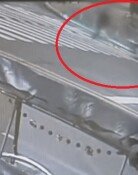Ready-mixed Concrete Makers Go on Strike
Ready-mixed Concrete Makers Go on Strike
Posted March. 20, 2008 07:58,
No ready-mixed concrete trucks appeared yesterday at a site where three apartment buildings were under construction in southern Seoul.
Workers there dealt with steel frames at only one building. Due to a strike by makers of remicon, or ready-mixed concrete, they could not work on the other two buildings.
Most construction work came to a halt after remicon suppliers halted production from midnight yesterday. They demanded an increase in concrete prices.
At several construction sites, workers even changed processes to continue their work. The majority of construction companies, however, are stuck in a rut.
Worse, foundries that produce iron-cast products, which have stopped production twice this month, said their strike will continue indefinitely unless their demand for higher prices is met.
A series of supply strikes thus threaten to further rattle the economy, which is already reeling from difficulties at home and abroad.
○ Opinion Gap
The Korean Federation of Ready-mixed Concrete Industry Cooperatives said, From midnight Wednesday, all of our members will not produce ready-mixed concrete until our demand is accepted.
Among 670 member firms, 180 are based in Seoul, Incheon and Gyeonggi Province. The Korea Ready-Mixed Concrete Industry Association, which includes large makers like Yujin Remicon, has also joined the shutdown.
Federation spokesman Bae Jo-ung said, The production stoppage is expected to continue for more than a week.
If the strike lasts for more than one week, it will inevitably affect most construction works nationwide, and in turn, burden apartment buyers.
A source from a construction firm said, If providers keep refusing to supply concrete, builders have no choice but to hire a lot more workers at once to finish their work in time. That will lead to a surge in construction costs.
If construction companies agree to higher prices, they will then have to pay more for other raw materials. Then consumers will see higher prices for new apartments from the second half of the year.
Lee Jeong-hun, chairman of the Korea Construction Procurement Part Association, said, If remicon providers immediately resume production, construction firms will negotiate supply prices Thursday or Friday.
In an emergency meeting, the association urged suppliers to stop their strike and adhere to terms agreed last year.
But experts predict that the strike will continue for a while since the suppliers want the government to change contract terms of state construction projects, while asking private builders to raise prices.
○ Is everyone a victim?
No ready-mixed concrete trucks were seen at another construction site in Seoul.
One worker said, Remicon makers used to stop their production for two or three days every year. If the concrete is not provided in time, lots of laborers have nothing to do.
Kwon Hong-sa, president of the Construction Association of Korea, told a news conference, Remicon suppliers demand a 12-percent price increase. But I think three or four percent is appropriate, the same as last years.
Construction companies are also struggling to come up with countermeasures to the strike.
Daewoo Engineering & Construction will create alternative processes for its 26 construction sites that need concrete. In Pangyo, south of Seoul, most firms are doing interior work first, and others are taking similar action.
Yesterday, all 34 concrete trucks stood still at a remicon factory in Yongin, a suburb of Seoul. The plants conveyer belts were also motionless.
Due to surging raw material prices, the supplier cut the number of employees to 17 from 30 in 2005. A worker said, Our wages have been frozen for several years. Moreover, we have not had a corporate picnic in three years.







